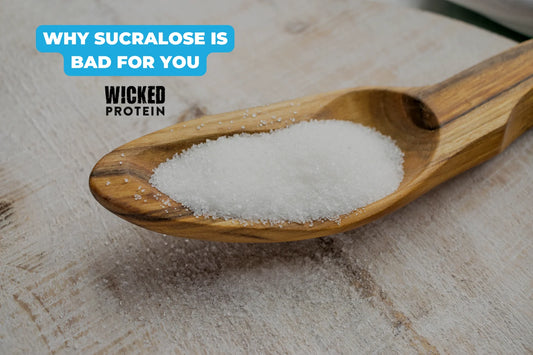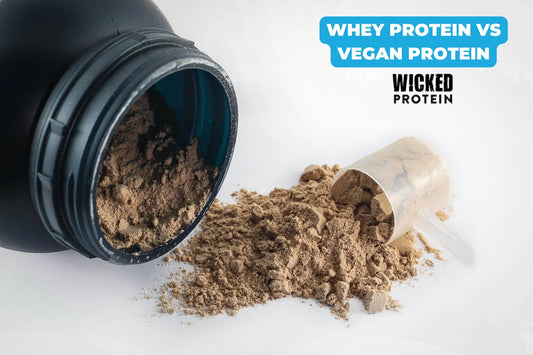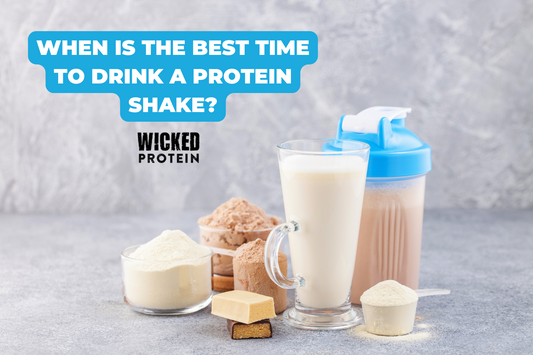
Protein Powder: Benefits, Uses, and How to Choose the Best
The human body uses protein to build and repair its muscles, enzymes and hormones.
Protein powder is a common supplement used by fitness enthusiasts, people on weight loss diets, and others. It’s quite easy to add protein powder to your diet, and that’s the reason why it’s so popular.
The Role of Protein in Your Diet
Proteins are essential for our body's repair, growth, and function. They are made up of amino acids and help with bodily functions, such as muscle synthesis.
In terms of nutrition, proteins are considered "macronutrients" because we need them in larger quantities compared to vitamins and minerals, which are called "micronutrients".
A balanced diet ensures that you have enough protein to support your immune system and metabolic processes. Additionally, proteins make you feel fuller than carbohydrates or fats, which can help with managing hunger and weight.
Muscle Building and Repair
Proteins play a crucial role in building and maintaining muscles, especially when they're growing and healing after exercise.
Proteins are the building blocks of every muscle contract
Our muscles are damaged and torn during exercise. We need protein to repair and rebuild these muscles.
Weight Management Benefits
Protein powder helps you lose weight because it makes you feel full, which means you won’t be tempted to eat other high-sugar foods. Protein needs more energy to break down than fats and carbohydrates, which helps your metabolism.
When you add protein powder to your diet, you can control your hunger in between meals, which means you’ll eat less junk food and consume fewer calories
By increasing your protein intake, you’ll be able to preserve your lean muscle mass while you’re losing weight. Lean muscle helps maintain your metabolic rate, which helps your weight loss be more successful.
Additionally, consuming protein powder may slightly increase the number of calories burned at rest. This is because muscles require more energy, even when you're not active.
While protein powder is not a "magic" solution, it can be a helpful part of a balanced nutrition plan for weight loss or weight maintenance.
Immune System Support
Protein powders can support the body's defense mechanisms by providing important amino acids.
- Antibody production: Amino acids play an important role in the formation of antibodies that help fight infections and viruses.
- Cellular repair: Proteins facilitate the regeneration of immune cells.
- Anti-inflammatory response: Certain proteins can help reduce inflammation, a response often triggered during illness.
- Gut health: Protein maintains gut health, which is fundamental for immune function.
Immunoglobulin-rich protein powders, in particular immunoglobulin-based protein powders, support the surveillance function of the immune system.
Plus, they also improve overall nutrition, which is important for the immune system.
Different Types of Protein Powders
Whey protein is derived from milk and contains all the necessary amino acids for muscle repair and growth.
Proteins derived from plants, such as peas, rice, and hemp, are excellent options for people with dietary restrictions or vegans.
Casein, another milk protein, digests slowly, providing a steady release of amino acids.
Whey Protein
Whey protein helps muscles recover faster by providing essential amino acids quickly after exercise.
- Fast absorption: Whey is easily digested and reaches the muscles quickly when they need it the most.
- Complete amino acid profile: It contains all the essential amino acids needed for muscle repair.
- Leucine content: Whey is high in leucine, which helps stimulate muscle protein synthesis after exercise.
- Supports immune system: Whey protein naturally contains immunoglobulins that may help strengthen the immune response.
All of these advantages make whey protein an ideal supplement for athletes who want to maximize their recovery. One of the main reasons for whey protein's success is that it contains BCAAs, which play an important role in muscle recovery and energy production.
Plant-Based Options for Vegans
Plant-based proteins are essential for vegans to ensure they get all the necessary amino acids that may be lacking in a vegan diet. These proteins offer a range of nutritional benefits tailored to plant-based diets.
- Soy protein isolate is a plant-based alternative that provides a complete amino acid profile, making it suitable for various dietary needs.
- Pea protein is a good choice for those with allergies, as it is free from common irritants like gluten and soy. It also has muscle-building properties.
- Brown rice protein, while not complete on its own, can still provide essential amino acids. When combined with other plant proteins, it enhances the overall amino acid profile, supporting muscle repair and growth.
- Hemp protein is rich in omega-3 and omega-6 fatty acids, as well as fiber, promoting both muscle synthesis and digestive health.
To ensure a comprehensive amino acid intake, it's important to combine different plant-based proteins. This mimics the benefits of animal-based proteins and meets the nutritional needs of vegan athletes.
Casein for Nighttime Snacking
Casein is a slow-digesting dairy protein that is ideal for nighttime consumption during sleep.
While we sleep, our body goes through an important recovery process, and a backup supply of amino acids can be beneficial. Casein makes a gel-like substance in the stomach, which slows down digestion and provides a continuous release of nutrients to the muscles for repair and growth. This slow digestion can last for several hours, supporting the body's recovery efforts.
Casein has a high biological value, meaning that the body can efficiently use the amino acids it provides. This is especially advantageous at night when our metabolism slows down, and a sustained release of amino acids can better contribute to muscle maintenance and growth.
Choosing the Right Protein Powder
Consider your dietary restrictions, taste preferences, and health goals.
Plant-based proteins are good for lactose intolerance or dairy sensitivities.
Whey protein is fast-absorbing for post-workout recovery.
Casein digests slowly, ideal for sustained nutrient delivery.
Avoid artificial additives and excessive sweeteners.
Look for products that are third-party tested and have transparent sourcing, just like WICKED Protein.
Ingredients to Look For
When choosing protein powders, look for complete proteins with all essential amino acids.
Incomplete proteins, like collagen, should be paired with others to get all the necessary amino acids. Complete plant-based proteins like quinoa or soy are important for vegans.
Branched-chain amino acids (BCAAs) like leucine, isoleucine, and valine are crucial for muscle repair and growth.
Select protein powders that contain natural ingredients, such as natural flavors and sweeteners like stevia and monk fruit.
Avoid protein powders that have a long list of ingredients that you don’t know about. In most cases, less is more.
Digestive enzymes such as: Protease, Amylase, and Lipase are useful for people who have digestive sensitivities. They enhance protein digestion and absorption, especially for people who consume high amounts of protein
Some protein powders may include additional ingredients like dietary fibers, omega-3 fatty acids, or vitamins and minerals for added benefits.
Understanding Protein Quality
The biological value of protein determines its assimilation and utilization in the body.
- Complete Proteins: Contains all essential amino acids necessary for protein synthesis.
- Protein Digestibility Corrected Amino Acid Score (PDCAAS): Evaluates protein quality based on both digestibility and amino acid profile.
- Biological Value (BV): Measures protein quality by calculating the nitrogen used for tissue formation versus nitrogen absorbed from food.
Higher PDCAAS and BV indicate superior protein sources, easily utilized by the body.
Consider these when choosing your next protein powder.
Maximizing Protein Powder Use
There are several different tactics that you can use to maximize the use of your protein powder.
Timing Your Protein Intake
Consuming protein strategically is important, especially around physical activity. It helps build and repair muscles.
After exercise, having protein can aid in muscle recovery and growth. This is because the body is more responsive to insulin and blood flow is increased, creating an "anabolic window" where protein intake can support muscle repair.
Before a workout, having protein, like a shake, can prevent muscle breakdown during exercise. It provides the necessary amino acids to fuel and recover your muscles.
Taking casein protein before bed is beneficial because it releases slowly, providing a steady supply of amino acids to your muscles throughout the night. This supports muscle recovery and growth while you sleep, maximizing results.
Time your protein and you’ll get an even better impact on muscle growth.
Creative Incorporation into Meals
Protein powder isn't just for shakes and smoothies. You can get creative and add it to savory dishes too.
Sprinkle protein powder on oatmeal to make it more filling and add a subtle flavor.
Experiment with protein powder in baked goods like breads, muffins, or pancakes. Just be careful not to make them too dense or dry.
You can add protein powder to a variety of different meals and beverages, check out 10 recipe ideas that are best mixed with protein powder.
Avoiding Common Mistakes
Misjudging personal protein needs can be counterproductive—more protein does not mean increased benefits.
Since 2018, research has consistently highlighted the importance of aligning protein intake with individual health goals and physical activity levels, avoiding a one-size-fits-all approach.
Ignoring the variety of protein sources can lead to monotonous consumption patterns, which may cause nutritional imbalances.
Selecting a protein powder based on marketing claims alone is ill-advised. Read through the ingredient list and nutrient profiles to ensure you're not compromising on quality.
Lastly, adding protein powder to your diet should be as a supplement, not a replacement for a balanced diet.
Frequently Asked Questions
1. What is protein powder and why is it beneficial?
Protein powder is a concentrated source of protein derived from various sources such as whey, casein, or plant-based ingredients. It is beneficial for muscle recovery, building lean muscle mass, and supporting overall health and wellness.
2. How can protein powder be used?
Protein powder can be used in various ways, including mixing it with water or milk as a post-workout shake, adding it to smoothies or recipes for an extra protein boost, or even as a meal replacement option for those on-the-go.
3. Is protein powder suitable for everyone?
Protein powder is generally safe for most people, but it's always recommended to do more research before supplementing. People with allergies or medical conditions should take extra caution and choose protein powders that align with their needs.
4. How do I choose the best protein powder for my needs?
When choosing a protein powder, consider factors such as your ddiet, fitness goals, and any specific allergies or intolerances you may have. Look for high-quality protein sources, minimal additives, and consider the taste and texture that suits your preferences.
5. Can protein powder help with weight loss?
Protein powder can be a helpful tool for weight loss as it can help increase satiety, support muscle growth, and aid in the maintenance of a healthy metabolism. However, it's important to remember that protein powder should be used in conjunction with a balanced diet and regular exercise for optimal results.
6. Are there any potential side effects of using protein powder?
While protein powder is generally safe, overusing it or using low-quality products may lead to digestive issues, such as bloating or discomfort. It's important to follow the recommended serving sizes and choose brands you trust to minimize the risk of side effects.
7. Can protein powder be used by vegetarians or vegans?
Yes, there are protein powders available that are specifically formulated for vegetarians and vegans. These powders are typically made from plant-based sources such as peas, hemp, or rice, providing a suitable alternative for those following a plant-based diet.
Conclusion
Protein powder is a beneficial supplement that can support muscle recovery, muscle growth, and overall health and wellness.
It’s great both for athletes looking to enhance their performance or people looking to increase their protein intake.
By understanding the benefits of protein powder, its various uses, and how to choose the best option for your needs, you can make informed decisions and maximize the benefits it offers.







